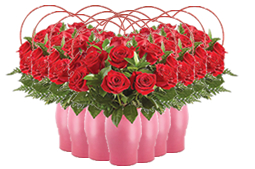 Florist Zhong Wenping is usually racing around at valentine’s time, preparing for Valentine’s Day. But this year her flower shop in Jingshan, a small city in central Hubei province, was quiet.
Florist Zhong Wenping is usually racing around at valentine’s time, preparing for Valentine’s Day. But this year her flower shop in Jingshan, a small city in central Hubei province, was quiet.
Like many places in the province at the centre of a deadly coronavirus outbreak, the streets of Jingshan were empty. Wedding banquets and other events were on hold. The shops are shut, as are cinemas, karaoke bars, restaurants and even banks. Checkpoints and guard posts have been set up at the entrance to every public building, and residential communities are in lockdown as authorities try to contain the outbreak that is believed to have started at a live animal and seafood market in the provincial capital Wuhan in December.
“It should have been the busiest day of the year for me because the Lunar New Year holiday is over and everyone should have been back to work,” Zhong told the South China Morning Post.
“I should have started preparing roses a week ago, but people haven’t been able to leave their homes since late last month – let alone do any celebrating,” she said. “Also, how can you really sterilise flowers?”
Flower shipments decimated
“The flower transportation capability related to the Chinese market reduced to 10 percent of the normal level. Consumption of flowers, not like daily necessities, was greatly affected during the special period,” said Guo Yanchun, the top executive of the Chinese general agent of Netherlands-headquartered flower care producer Chrysal.
“Our company majors in flower care products, which are relatively easy in stocking. We are already experiencing the influence of the epidemic. However, the influence for the fresh-cut flower enterprises is even bigger,” she said, according to the Asia Times, citing a China Daily report.
Chen Yingxu, general manager of Beijing Jing Ke Hong Xiang Import and Export Trading, said the shipment of roses that were supposed to be transported to China were not shipped due to several flight cancellations.
“As sales during the Valentine’s Day normally account for one third of that of the whole year, it is estimated that the loss of Yunnan’s flower industry, including supporting industries such as logistics, during the special period will reach 3 billion yuan to 5 billion yuan,” said Wang Jihua, deputy director of the Yunnan Provincial Academy of Agricultural Sciences.
Flower sales plunge
The risk of infection, which has left most lovers house-bound, has battered Valentine’s Day sales for businesses hoping to cash in on love.
Flower shop Xian Hua Ge in Beijing said that sales plunged by up to 70 percent from last year – partly because many have not returned to the city to work.
Lu Ting, chief China economist at Nomura, said that the “return rate” of workers for China’s four Tier-1 cities was only 19.4 percent as of 9 February, far below 66.7 percent a year ago.
A worker at Romanti Fresh Flowers said sales had dropped up to 50 percent in part because customers were fearful of virus transmission via delivery staff, while another shop said they had “no stock”, The ASEAN Post reports.
